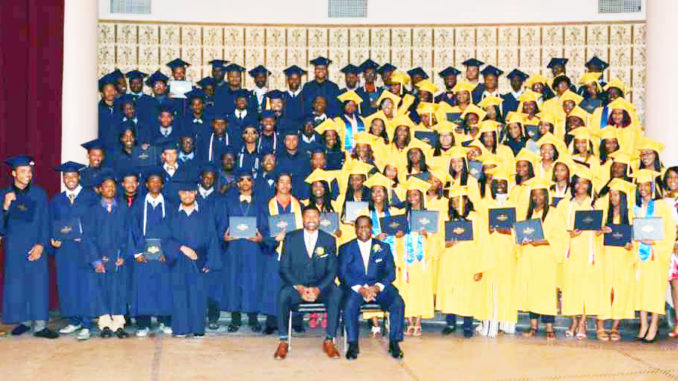

by Christina Santi via ebony.com
Other than being an ESPN analyst, Jalen Rose also works tirelessly to serve his local community. The retired NBA player opened in September 2011 the Jalen Rose Leadership Academy(JRLA), an open enrollment, tuition-free public charter high school in Northwest Detroit. It serves 400 students in ninth through 12 grade from metro Detroit with a 9-16 model, in which students are supported not only through high school graduation but through college graduation via a college success team that works with current students and alumni.
The JRLA has a 93 percent graduation rate and 100 percent college and post-secondary acceptance rate.
Rose spoke exclusively with EBONY.com about why the school is important, what he hopes his students get from their time on campus and the controversy surrounding the national anthem.
Why do you think it’s important to give back to your community by opening a school as opposed to other ways you can help?
Education is a valuable tool that unlocks the future of so many young people, and the dynamics in our country have changed, which is [why I chose to] be the founder of a tuition-free public charter high school that gets zero state funding for the facility. It was important not only from myself but our co-founder,Michael Carter, as well. [We wanted] to not only be able to influence the dynamics of our scholars graduating from high school nine through 12 but [also] to give them that level of support and guidance that allowed them the opportunity to graduate from college, which was 13 through 16.
We’re proud and unique in a lot of ways to carry a nine through 16 model, whereas we approximately have 450 kids in the building this upcoming school year and around 300 in college or university community college, military and trade school. In June, it will be the first time we have JRLA scholars that graduated from colleges across the country that will have the opportunity to attend our graduation and speak to the graduates of our senior class. So that is what I think allows our scenario to be really unique and I’m proud of that dynamic.
Several people I know in the education sector complain about how the curriculum is more based on setting kids up to pass state exams as opposed to teaching skills that would benefit them in the future. How would you say the JRLA enriches your student body with skills that will help them in the future?
That’s not a school thing, per se. That’s a society thing that has continued to foster throughout our country and look no further than the dynamics of how many people work in a field that was their major in college.
I’m one of the few that I know.
I am too, communications: radio, TV & film. So that dynamic in our educational system [whether it be] public charter, magnet, private, college, university, high school, elementary school and middle school is all theory. So, to me, that’s one conversation.
So now what we’re able to do, as a charter school [is] craft programs that allow the young people to get skills other than reading, writing and arithmetic.
We have a leadership course. We teach young people about decision-making, problem-solving, sex, drugs, violence, gangs and etiquette. [Our school] has advisory, where we get to know our scholars up-close and personal, [including] what makes them tick and their interests; we try to steer them in that direction. We’re also unique because while most public schools and charter schools are not open in July, we are.
The JRLA has something called Summer Session, which is not summer school for students who failed classes. Through this program, we create other experiences, college experiences on-campus experiences and we provide each of our scholars with an internship.
It’s crucial for us to get our scholars out in the community to do charity work and to give them the life skills they will need to be successful in the endeavors that they have, and it’s more for us than just obviously the curriculum that’s required to graduate from school.

There’s a clip from ESPN’s morning show Get Up, where you speak about how the capacity to fill up prisons is based on third-grade aptitude tests. Since your school is from ninth to 12th grade, how are is the JRLA combatting the school to prison pipeline?
The skills I described earlier to give young people the skills they will need to be successful in any field, with any endeavor they choose or in whatever situation that they’re faced with. [That includes]: how to deal with adversity, how to deal with success, how to change your life, how to make those around you that you love proud. We combat [the] school-to-prison pipeline by not only giving them a learning environment but by also providing mentorship. One of our corporate partners who’s been amazing, for example, is Jeep. They not only have provided financial support as it relates to scholarship funding but also offered mentors and experiences for our students.
The JRLA has been able to attract corporations and people that have dedicated their time, their energy and their resources to help influence our scholars [and] our community in a positive way. It continues to affect the community, and that’s what we look to—for our students to be productive members of society.

Be the first to comment